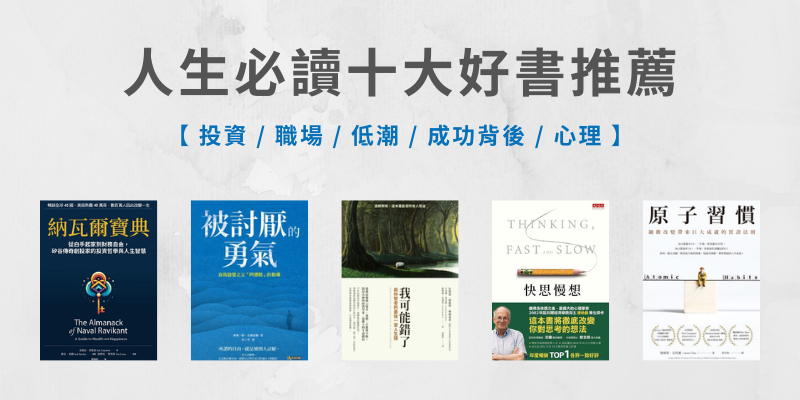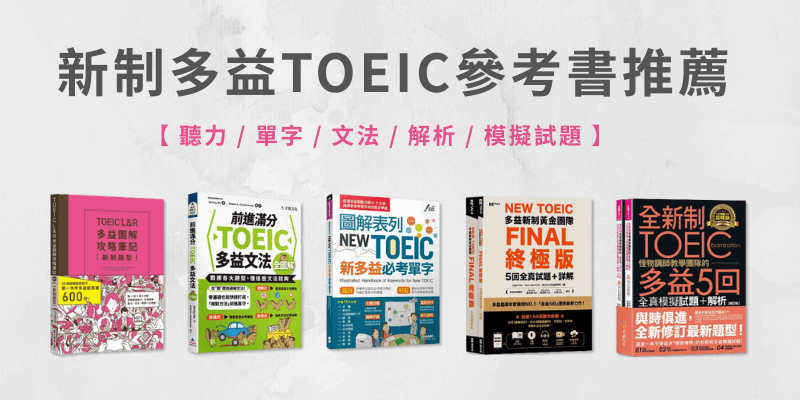- front page
- Recommended Articles
- Life
- Recommended Top 10 Must-Read Books for Life | A List of Classic Books You Can't Miss While Growing Up
Recommended Top 10 Must-Read Books for Life | A List of Classic Books You Can't Miss While Growing Up
dateSep 19, 2025
updateSep 19, 2025
authorNana
瀏覽數:16915

Image Source: Canva
The value of a "must-read book" lies not in its ability to change your life immediately, but in its ability to accompany you to think, change your mind, an
1. Man’s Search for Meaning: A Must-Read Classic Psychology Book for Those in Low Moments
.jpg)
Product link: Go now
"Man's Search for Meaning" is Viktor Frankl's masterpiece. He was an Austrian psychologist who, during World War II, was sent to a Nazi concentration camp. In such an environment, people were not only deprived of their freedom, but even their reason for living gradually disappeared. Yet, Frankl tells us in his book that, amidst this hellish existence, he still found a strength to resist being consumed by despair. He observed that what truly sustains life is not external circumstances but "finding meaning in life." When people completely give up because they see no future, some can persevere. This is often because they still have a deep attachment, whether it be a love, a dream, or even simply the desire to record this experience.
Reading this book was deeply moving, as it isn't an abstract theory, but rather a psychologist's personal experience in extreme circumstances. It proposes the concept of "logotherapy": even in the most painful circumstances, one can still choose one's attitude. For example, in the concentration camp, he lost all his possessions and academic achievements, yet he told himself, "These things can be taken away, but no one can take away my way of facing pain."
Man's Search for Meaning is a book you need especially when you're at your lowest point. It doesn't offer false reassurances, "Everything will be fine," but honestly tells you: Pain is inevitable, but you can choose how to cope with it. This reminder is more powerful than any "positive energy." This book is perfect for moments of confusion, frustration, or lows. It will make you rethink: Is it our circumstances that determine us, or do we determine how we respond to them? Often, the answer lies within your own hands.
2. The Little Prince: A must-read allegory for all generations
.jpg)
Product link: Go now
Many people first read "The Little Prince" as students, dismissing it as a mere fairy tale: the little prince lives on an asteroid and converses with roses and foxes. But as you read it again as an adult, you realize it's not a fairy tale at all, but a life story for adults. The most iconic line comes from the fox: "You are responsible for everything you tame." While reading it young might seem romantic, it's only after experiencing relationships, family, and even workplace responsibilities that you realize it truly speaks to relationships and responsibility.
The charm of The Little Prince lies in the fact that readers of it at any age experience it differently. At twenty, it feels romantic; at thirty, it reveals responsibility and loneliness; and when I read it again after forty, I understand the impermanence and the importance of cherishing. For me, this book is like a mirror, reflecting my current stage of life. It is a good book to read at any time, reminding me not to forget innocence and sincerity.
3. The Courage to Be Disliked: A Must-Read Book for Self-Growth
%20(1).jpg)
Product link: Go now
The title is provocative, but its true meaning is "Be Brave to Be Yourself." Through conversations between philosophers and young people, this book introduces Adlerian psychology, challenging many of our habitual assumptions: You are not a victim of your circumstances, but rather you can choose how to live. A key concept is "issue separation." Often, we find ourselves exhausted because we try to control others' judgments or even shoulder their emotions. Adler reminds us that everyone has their own issues; we don't need to live for others, nor do we need others to make decisions for us.
I think the greatest value of this book is that it can make people "breathe a sigh of relief." If you always compromise because you are afraid of being disliked, this book will help you to bravely say, "This is my life." It is suitable for reading when you want to break through yourself but are afraid of being rejected. It is not just a psychology book, but a guide that can help you live more freely.
4. How to Win Friends and Influence People: A Must-Read Guide to Workplace Relationships
.jpg)
Product link: Go now
Dale Carnegie's classic work, How to Win Friends and Influence People, remains as relevant almost a century after its publication. It's not about rhetoric, but about human nature. Carnegie emphasizes that humanity's deepest need is to be understood and affirmed. The book contains many seemingly simple tips that can make a real difference. For example, he reminds us not to rush to criticize others, but to begin with appreciation. This may sound mundane, but in everyday communication, it's often the most touching step.
While reading it, I felt that this book is not just for workplace relationships, but actually applies to any context where building relationships is necessary. It's not about "pretending to be nice," but about being genuine with others. If you often feel stuck in interpersonal interactions or constantly frustrated during workplace negotiations, this book will help you find some very practical breakthroughs.
5. Poor Charlie's Common Sense: A Must-Read for Investment Thinking
.jpg)
Product link: Go now
This book captures the wisdom of Buffett's longtime partner, Charlie Munger. Unlike typical investment books that focus solely on numbers or techniques, Munger emphasizes "mindsets." His most famous quote is, "If all you have is a hammer, everything looks like a nail." This reminds us not to use a single piece of knowledge to explain everything. Instead, Munger advocates for "multiple mental models," meaning you need to absorb knowledge from across fields and integrate it to make better judgments.
To me, this book is more like a "life decision-making manual" than an investment book. It does not teach you "how to make quick money" but "how to avoid making bad choices." It is suitable for reading when you are about to face major decisions, whether it is investment, entrepreneurship or career choices, it can give you a more comprehensive view.
6. Atomic Habits: A Must-Read Guide to Life-Changing Habits
.jpg)
Product link: Go now
James Clear's Atomic Habits has been a popular growth book of the past decade. Its core concept is simple: change isn't achieved through willpower, but through small habits and environmental design. One example in the book particularly struck me: someone who wants to develop an exercise habit doesn't need to set a lofty goal of "running ten kilometers a day" right from the start. Instead, simply place your sneakers by your bed to make it easier for you to take the first step, and change will begin.
The most powerful thing about this book is that it reminds us: "Focus on the system, not the goal." When you focus on the process rather than the destination, you will find that change is easier than you thought. It is very suitable for people who want to develop new habits. Whether it is health, learning, or work efficiency, this book can provide practical guidance.
7. "I May Be Wrong": Learn to Look at Life with a Normal Mind
.jpg)
Product link: Go now
Author Björn Natiko Lindbrau, once a promising business executive, gave up everything at 26 to pursue a 17-year-old spiritual practice in the Thai forests. After returning to secular life, he struggled to readjust to society while battling depression and ALS. This book is surprisingly engaging, despite its focus on spiritual practice, and instead overflows with sincerity and humor. The stories the author shares often elicit a smile, yet leave a lasting reminder.
My favorite sentence in the book is: "Most of the things I worry about in my life never happen, and most of the things that do happen I could never have predicted." This sentence is like a key that can help people unlock the chains of anxiety.
This is a great book to open when you are anxious or down. It reminds us to accept the uncertainty of life and find comfort in imperfection.
8. Deliberate Practice: The Must-Read Science Behind Success
.jpg)
Product link: Go now
This book challenges the idea that genius is innate. Author Anders Ericsson draws on extensive research to demonstrate that the top performers in any field are cultivated through years of deliberate practice. The key isn't how long you practice, but how you practice. Good practice requires clear goals, continuous feedback, and the courage to step outside your comfort zone. This explains why some people practice for ten years without making any progress, while experts improve year after year.
For me, this book is very down-to-earth. It doesn't tell you "you will succeed as long as you work hard", but reminds you to work hard strategically. It is suitable for students, professionals or anyone who wants to improve their skills. When you start practicing with the right methods, you will find that you can really make a difference.
9. Thinking Fast and Slow: A Must-Read Classic in Cognitive Psychology
.jpg)
Product link: Go now
Written by Nobel Prize-winning economist Daniel Kahneman, this book divides thinking into two systems: fast intuition and slow reasoning. It contains numerous examples of "thinking traps," such as the "halo effect": when we see someone excel in one area, we tend to mistakenly assume they excel in other areas as well. These biases, though invisible, influence our judgment every day.
When I was reading this book, I often felt like I was holding up a mirror, because I had made the same mistakes in judgment mentioned in it. This process of self-awareness is the most valuable part of this book. It is suitable for reading when you want to improve your judgment, and it will help you be calmer and more rational when making important decisions.
10. Navarre's Guide: An Action Guide to Wealth and Freedom
.jpg)
Product link: Go now
This book compiles the essence of Silicon Valley investor Naval's thoughts. He talks not only about wealth, but also about the philosophy of life of learning, happiness and freedom. The concept Naval emphasizes most is "compound interest", not just compound interest on money, but also on knowledge, connections and habits. These things accumulated over a long period of time are the real assets of life. He also reminds us to make good use of "leverage", not just manpower, but also capital, technology and knowledge.
When I was reading it, I felt that this was not like an ordinary motivational book. It does not tell you that "hard work will lead to success", but teaches you "how to choose the right direction". This book is suitable for anyone who wants to pursue financial freedom. It is very pragmatic, but at the same time it also has a sense of openness, allowing you to rethink your life goals.
Quick Reference List of Recommended Good Books for Life
| Title | author | Core Values | Suitable stage for reading |
|---|---|---|---|
| 1. Live a meaningful life | Victor Frank | Finding meaning in life through suffering | Low tide, confusion |
| 2. The Little Prince | Saint-Exupéry | The philosophy of life in fairy tales | Youth and Maturity |
| 3. The courage to be disliked | Ichiro Kishimi/Fumitake Koga | Be brave and be yourself | When you care about other people's opinions |
| 4. Human Weakness | Dale Carnegie | Interpersonal Communication Required Course | Workplace and interpersonal bottlenecks |
| 5. Poor Charlie's Common Sense | Charlie Munger | Multiple thinking models | When important decisions are needed |
| 6. Atomic Habits | James Clear | Small habits lead to big changes | When you want to change your lifestyle |
| 7. I might be wrong | Bjorn Natiko Lindblad | Look at life with a normal mind | When you are anxious or obsessed |
| 8. Deliberate Practice | Anders Ericsson | The science of skill development | Learning and growth period |
| 9. Think fast and slow | Daniel Kahneman | Cognitive biases and thinking patterns | When you want to improve your judgment |
| 10. Navarre's Treasure Book | Compiled by Eric Jorgenson | The Action Philosophy of Wealth and Freedom | When you want financial and life freedom |
Conclusion: The content of the book is not the answer, but a friend who accompanies you on your journey
Many people read in the hope of finding "an instant answer to their life's problems." But in reality, books don't solve problems for you; they simply remind you that life has more possibilities. These ten recommended books cover every need, from lows to growth. Some can empower you, others provide direction, and some can help you stay sane. The true value of reading lies not in how many books you've read but in how much action a book can inspire you to take. The purpose of reading isn't to accumulate knowledge, but to give you more freedom and choice in life. When a book can sustain you through difficult times, or even lead you down a different path, that's what makes it a must-read.(This article is owned by Darrick, and reproduction of pictures and text is prohibited)





